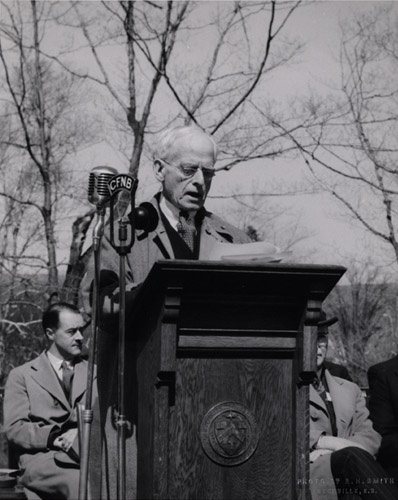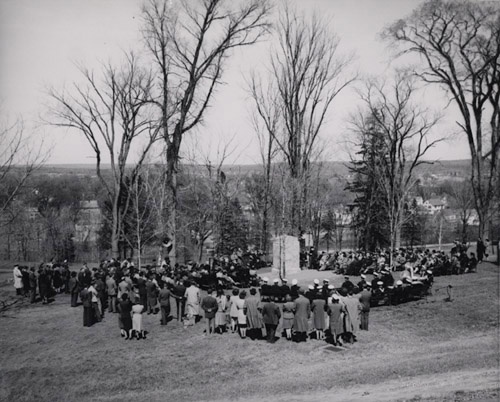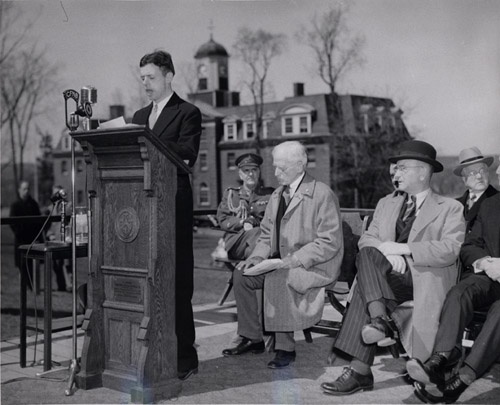By Dr. J.C. Webster

In the name of the Historic Sites and Monuments Board of Canada and by authority of the Dominion government I welcome you to this ceremony.
Last year, in our annual meeting, when the placing of tablets in honor of certain distinguished Canadians was under consideration, I proposed a departure from the regular procedure in the case of three names on the list viz., Bliss Carman, Charles Roberts and Francis Joseph Sherman. These men had been born in the area of the capital of New Brunswick, had been educated in its university, had gained international distinction as poets and, finally, had found burial on Forest Hill in their native city.
In view of this unique record I urged that a special monument be erected here in honor of these three notable sons of New Brunswick whose achievements had won for their native city the designation, “The Poets’ Corner of Canada”.
My proposal was received with unanimous and enthusiastic approval of the board, whose members are appointed from all parts of Canada.
The choice of a site was left to my decision and I had no hesitation in selecting the campus of the university, whose authorities immediately acquiesced. And so today, we are assembled to unveil and dedicate this memorial—a tribute from the Dominion of Canada.
In honoring these men I do not forget that this region has produced others gifted with the power of poetic expression. An interesting account of them is to be found in a booklet recently published by Mrs. Dr. Brown Maxwell, entitled, “The River Saint John and Its Poets”. Some of them are no longer alive, but others are still active and are represented here today.
Frankly, I have been puzzled by Mrs. Maxwell’s revelation. Why should this area of the Saint John River be so favored? What is wrong with the Miramichi or the Northumberland Straits? Why was Lord Beaverbrook not a great poet rather than a financier, newspaper proprietor and statesman? Why has not Bay du Vin, Buctouche or even Shediac produced a poet of standing? These places have iodine in the air, oysters and sea-fish in their waters—foods which are generally believed to stimulate brain activity. My view is, after considerable thought, that there must be in York County a localized virus, and that, therefore, we must look forward to a continuance of its manifestations.
But, whether Fredericton or Buctouche be the area favored for poetic productivity, these gifted writers belong to New Brunswick and the province is proud to claim them. It is, therefore, fitting that I should now ask a representative of the province to take official notice of this ceremony and to contribute to its program.
I have much pleasure in calling on the Hon. D. L. MacLaren, Lieutenant Governor of New Brunswick, to unveil the monument, read the inscription on the bronze tablet, and address this gathering.
Read the Lieutenant-Governor's Address by the Honourable D.L. MacLaren, P.C.

Carman, Roberts and Sherman were all students at the University. This Memorial, placed in intimate association with the life of undergraduates, may serve to encourage the efforts of many who may strive to develop their minds to the fullest degree.
But I am also concerned that it should be a constant reminder to the entire University that arts and letters and the humanities should not be discredited but should ever be cherished as essential factors in a liberal education. That our universities need to be warned of error or forgetfulness in this regard is evident from what has taken place throughout Canada as a result of the late terrible war, which impressed on all countries the dominating part played by science in all fields of activity, other factors, even man-power, tending to be minimized.
In consequence in the reconstruction period when young men rushed to the universities for education, their thoughts and desires were predominantly science-wards. The echoes of the atomic bomb were still reverberating in their ears, tending to drown out those gentler whispers of the inner spirit pleading for the humanities.
No one is more conscious of these trends and tendencies than the present President of the University. A most distinguished soldier of World War I, a most efficient trainer of young soldiers and an organizer in World War II, he had retained his balance of mind, his understanding of youth and that kindliness of nature which has won for him the soubriquet of “well-beloved”.
In seeking for a chief speaker on this occasion I had in mind at first the possibility of finding an expert literary critic who might present an elaborate analytical survey of the works of our three poets. However, I decided that this would be quite out of place for various studies by competent writers have appeared in print and are available to readers; I might particularly refer to that learned authority on Canadian poetry, Dr. Lorne Pierce, well known in our university.
It has seemed to me more fitting to disregard technical or pedantic studies and to regard this ceremony as an opportunity for referring to the cultural aspirations and achievements of our people.
Throughout the civilized world, certain well defined standards have been accepted in determining the cultural status of a community or nation. They are an appreciation for good literature, fine architecture, painting, sculpture, music and the drama; while, outwardly, there are evidences in the shape of private and public libraries, museums, theatres, art collections, historical collections and monuments.
A survey of Canada reveals great differences as regards these criteria. In their highest manifestations they are worthy of comparison with the best which may be found in other lands. I know no man in all Canada who more fittingly represents this highest type of citizenship than the Right Hon. Vincent Massey, who is to address us today. Throughout his entire life he and his family have been foremost in promoting the cultural advancement of Toronto, now the home of a renowned university, Schools of Music, Art and the Drama, a renowned Symphony orchestra, a Museum of Archaeology, one of the world’s important treasure-houses, and a remarkable and most enlightened Public Library System.
Man of affairs, Minister to the United States, High Commissioner to Great Britain, he has always served his country with marked efficiency and with the commendation of his own people and those to whom he has been sent.
In all these experiences he has been ably seconded by his wife, a daughter of the late Sir George Parkin, a native of this province and one of our most distinguished sons.
Read the Poets' Memorial Address by The Right Honourable Vincent Massey
A MEMORIAL POEM
A letter has been received from the president of the Canadian Authors’ Association, Mr. William Arthur Deacon, of Toronto, expressing his regret at being unable to be present at this ceremony. He points out that one of the three writers in particular, Sir Charles G. D. Roberts, was a great force in the association and was for many years its honourary president. Mr. Deacon declares that the association regarded Sir Charles as the founder of modern Canadian literature. In his absence Mr. Deacon has asked Dr. Desmond Pacey, head of the department of English at this university, to act as representative of the Canadian Authors’ Association and we are happy to have him with us on the platform.
“We had hoped to have with us today the main surviving link with the three men we honor, Dr. Theodore Goodridge Roberts, brother of Sir Charles Roberts, cousin of Bliss Carman and friend of Francis Sherman. It was unfortunately impossible for him to attend but he has written and sent us a special memorial poem for the occasion. This poem will be read by an old friend of Theodore’s and a poet in his own right, Dr. Alfred G. Bailey, Dean of Arts and head of the department of History in this university.”
Dr. Bailey then read the following poem:

BUT NOT WITH THE HOMING BIRDS
By Theodore Goodridge Roberts
The geese return: stiff wings raking the stars,
Straight necks outthrust, strong hearts beating in time,
Thin cries shaking down to our longing souls:
Heralds of spring and all past Summers’ joys.
But not with the homing birds and the waxing suns
Come sight or step or shadow of them who made
The song that kept our hearts through frost and snow.
Of them we have only their names, and the word they left
Of these rivers and hills they knew, that we may know them
Year after year, remembering from Spring to Spring.
- Main Page
- Anniversaries
- Brief History of UNB
- Buildings
- Faculties and Departments
- Governance and Administrative Positions
- Lecture Series
- Official University Events and Symbols
- People of UNB
- Plaques, Monuments and Structures
- Prizes and Awards
- Sports and Athletics
- Student Clubs and Societies
- Student Events and Escapades
- University Publications
- Women's Sports at UNB
- About UNB Archives and Special Collections
Request an Appointment
Prior arrangements must be made for the retrieval of this material. Please email archives@unb.ca to make an appointment.
Procedures
Help Desk Hours
- Monday - Friday
- 10:00 am - 12:00 pm
- 1:00 pm - 4:00 pm
Contact Us
- 5th Floor, Harriet Irving Library
- University of New Brunswick
- 5 Macaulay Lane, Box 7500
- Fredericton, NB E3B 5H5 Canada
- archives@unb.ca
- Staff Directory